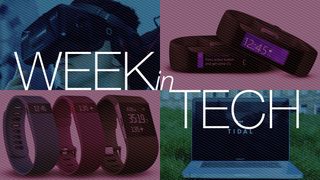
While everybody's getting excited about Halloween ghosts and ghouls, we've been thinking about something much more terrifying: getting fit. Microsoft is the latest firm to climb onto the fitness tracking bandwagon with its Microsoft Band, but there are new Fitbit bands and Google's new Google Fit to consider too. We'll also discover a brand new music service for audiophiles and the reason big-name retailers are boycotting Apple Pay. It's a spooktacular Week in Tech!
Sensors working overtime
If Microsoft had a truck, it would be a band wagon: Redmond's latest hardware adventure is a fitness tracker which may or may not be called the Microsoft Band. It has ten sensors, 48-hour battery life and runs Windows for Workgroups 3.11, and only one of those things is a lie. It's on sale this week in the US for $199 and we'd expect a global rollout shortly afterwards.
Enter Sandman
Nintendo would like to watch you sleep. Not in a creepy way, but through the magic of health tracking technology. Its incoming sleep tracker isn't a wearable, though: it'll use radio waves to monitor your heart rate, respiration, movement and fatigue. The gaming firm's move into health isn't as odd as it sounds: as Hugh Langley points out, its history includes "playing cards, love hotels, food, and even a taxi service". Games are a fairly recent specialisation.
You're fit and Google knows it
Google's health platform, Google Fit, is now live - and it's designed to track your health across Android devices, Android Wear wearables and your web browser. It doesn't work with iOS yet, but that's coming and Google has even loftier ambitions. Its moonshot division, Google X, hopes to make wearables that can kill cancer cells.
Oculus VR: all you need is a little patience
It looks like our Oculus predictions of a 2015 limited beta release were accurate. New owner Facebook has a ten-year-plan and hopes to sell 50 to 100 million units, but not in the next few years. According to Mark Zuckerberg, while VR will be big "it's going to take a bunch of years to get there."
FLAC! Ah-aaah!
Good news for fans of FLAC, the file format for people with really good ears: there's a FLAC-flinging Spotify rival in town, it's called Tidal Music and it sounds brilliant. James Rivington explains: "It's been designed from the ground up to be the ultimate music resource for fans of hi-fidelity music, offering playlists and recommendations curated by experienced music journalists, not to mention 75,000 music videos." At £20 it costs twice the price of other subscription services and there are currently holes in the available catalogue, but it's a great service for hi-fi fans.
Charge of the fit brigade
Fitbit has not one, not two but three new fitness trackers to show you: the Charge, Charge HR and Surge. The first two are replacements for the ill-fated Fitbit Force, and the third is a fitness watch with built-in GPS. Matt Swider put the FitBit Charge through its paces, and while it isn't dramatically different to last year's tech it's a decent device at a decent price.
Get daily insight, inspiration and deals in your inbox
Get the hottest deals available in your inbox plus news, reviews, opinion, analysis and more from the TechRadar team.
The day the music died (a little bit)
This week we discovered that Apple didn't kill off the iPod Classic because it was fed up with it; it had to go because Apple simply couldn't get the bits any more. The bits in question were Toshiba's tiny hard disks, and when Toshiba decided to stop making them Apple decided not to give the Classic flash storage like the rest of its iPods.
No Pay pals
A number of big-name retailers are boycotting Apple Pay, the NFC-based payments system. That's because they'd rather use the considerably more cumbersome CurrentC platform, a QR code-based system that's already been hacked, even though it hasn't launched yet. Unlike Apple Pay, CurrentC shares your information with retailers, and unlike Apple Pay it sounds pretty rubbish.
- Not sure what's the best wearable for you? Check out our list of the best smartwatches.
The TechRadar hive mind. The Megazord. The Voltron. When our powers combine, we become 'TECHRADAR STAFF'. You'll usually see this author name when the entire team has collaborated on a project or an article, whether that's a run-down ranking of our favorite Marvel films, or a round-up of all the coolest things we've collectively seen at annual tech shows like CES and MWC. We are one.
